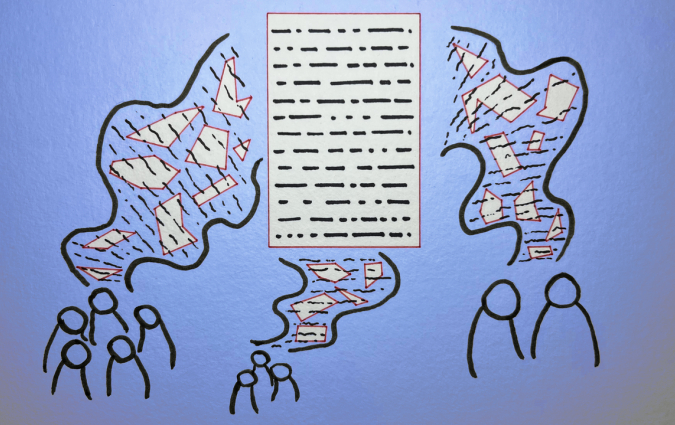Our podcast: Digital News Report 2021. Episode 5. How do people think about the financing of the commercial news media?

Read this year's Digital News Report here.
The topic
This episode of our DNR 2021 podcast series looks at public understanding of the financial pressures that the news media is under, how much they are concerned about it, and what they think should be done.
The speakers
Rasmus Nielsen is co-author of the Digital News Report and Director of the Reuters Institute and Professor of Political Communication at the University of Oxford. His work focuses on changes in the news media, political communication, and the role of digital technologies in both.
Richard Fletcher is a Senior Research Fellow at the Reuters Institute, and Team Leader of the Research Team. He is primarily interested in global trends in digital news consumption, comparative media research, the use of social media by journalists and news organizations, and more broadly, the relationship between technology and journalism.
Our host Federica Cherubini is Head of Leadership Development at the Reuters Institute. She is an expert in newsroom operations and organisational change, with ten years of experience spanning major publishers, research institutes and editorial networks around the world.
The podcast
The transcript
On public perceptions of financial sustainability ↑
Federica: For those who work in the news industry or are passionate about it, the conversation about the business sustainability of journalism is a crucial one. Print has been declining for a while now and, in the last year, we witnessed the global pandemic accelerating this decline further impacting the bottom line for many independent media companies. Digital advertising revenues or a big part of it goes to Facebook, Google and a few other large digital platforms. And while we’ve seen an increasing number of publishers turning to direct reader revenue like subscriptions or membership, the overall percentage of people paying for online news remains low even though we’ve seen in this year’s Digital News Report a significant increase in payment for online news in a small number of richer Western countries.
In this kind of environment, it is crucial to know what audiences think of these issues; especially when a few governments are considering stepping in to help independent news organisations in different ways. I guess the place to start here is with the audience itself. Rasmus, you’ve studied this issue for a few years and analysed this year’s data; do people know about the difficult financial situation of the news industry?
Rasmus: The short answer’s no. It’s only 31% of our respondents who recognise that most news publishers are less profitable today than they were ten years ago. And there are many who think that they are as profitable or more profitable than they were in the past and then about a third who just say flat out that they don’t know. I mean I think this is perhaps surprising for some in the profession in the industry itself. There are fewer things that journalists are more keenly aware of than the financial travails facing much of the industry; whether they are veterans who’ve been through years of cost-cutting in the newsrooms or younger journalists who’ve joined the profession during lean years and lived their whole professional life with precarity and short term contracts and frequent layoffs.
But I think it’s important to recognise here that more broadly while our research suggests that people have a clear and often quite sensible sense of what major news providers have to offer including how trustworthy they are, many people have a pretty limited understanding of the more detailed issues around the news industry and the media environment ranging from how journalists and editors work to basic features of our media environment like the fact that the Facebook newsfeed is ranked by algorithms. And, of course, I think we also need to recognise that that’s arguably no different from most people’s pretty limited understanding of the details of many other important institutions or industries in our societies whether universities or pharmaceutical companies.
On audience concern for news industry finances ↑
Federica: I’m sure many journalists listening to us now will find it unbelievable that some people think the news media are profitable. But I guess another question here is whether audiences are concerned about the financial state of the news industry in the first place? Richard, what do we know about this?
Richard: Well, given that only a small number of people think that the commercial news media is less profitable than it was and media financing is not something that is a top priority for much of the public, as Rasmus has mentioned, it’s perhaps not surprising that we also find that public concern over the financial state of commercial news media is low. So across the 33 markets where we fielded this question, just under a third – 31% - said that they’re concerned with half (51%) saying that they’re not concerned. The rest said they don’t know in response to this question – probably because it’s not something that they’ve given much thought to in the past.
On variations by country ↑
Federica: And are these results across these countries consistent or do you see a variation in any region?
Richard: Well, as you might expect, the numbers do vary a little by country but the general pattern is actually quite consistent. So in all but a tiny handful of countries, more people say that they’re not concerned about the financial state of commercial news media than say that they’re concerned. When it comes to picking out patterns by region, this isn’t straightforward because I think there are lots of country-specific factors that might influence people’s attitudes on this one way or the other. But I think it’s also noticeable that in Northern Europe, where there’s typically both prominent and well-funded public service media and relatively high levels of paying for online news, concern tends to be lower than it is elsewhere.
On attitudes to government support ↑
Federica: Some countries have a history of government intervention; either via direct or indirect subsidies. Rasmus, do people think that government should step in to help commercial news organisations that can’t make enough money on their own?
Rasmus: There’s not a lot of public support for the idea of stepping in to support commercial news organisations that can’t make enough money on their own. Now there are, of course, some public policies that we pursue even without majority public support and similarly there are public policies that do have majority support that we don’t pursue for other reasons. And this really, I think, is a personal question for each of us to make up our own minds about as citizens and for those who represent us as elected officials. What I will say is that, while there is no clear public support for this according to our data, we do know that there are policy options available if the public and the elected officials who represent them are willing to commit real resources and that it’s possible to structure these policies in a way that insulates news media for political influence and minimise distortions in the marketplace.
We see this in the form of genuinely independent public service media with clear, defined remits and the ability to operate across different platforms that we see in some parts of Europe. We see this in the form of indirect subsidies that have long been in place in many countries across the world; VAT exemptions and the like in recent years also extended to digital news belatedly. And, of course, in some countries also direct subsidies which can be tricky territory because sometimes they are used as handouts to prop up incumbents or politically aligned publishers. But they can be designed in ways that primarily support investment and independent, professional journalism and does not give politicians or civil servants or others leverage over the publishers who are receiving support. And that’s really a political question for each of us as a citizen and for elected officials whether they want to pursue these options. But what our data can show is that, at this stage at least, there doesn’t seem to be a broad-based public support for this in the countries where we field these questions.
And I think from journalists and the news media side, I think it is worth thinking about what that means because, of course, given the very real crisis that much of the industry continues to face even as some titles are doing quite well and have come through the crisis stronger arguably, there seems to be a clear case for some form of public policy intervention to address market failure at least in principle. But I do think that journalists and news media need to think about whether such a policy intervention needs to be based on broad based public and political support to ensure its legitimacy and resilience and reduce the risk that disagreement over media policy become yet another issue that further polarises public opinion about journalism and the media and risk undermining trust in the news if it isn’t based on clear public support.
On government intervention and trust in news ↑
Federica: Richard, I wonder whether there are any factors that determine how news audiences think about government intervention? Can things like trust in news or high interest in news predict how people think about these issues?
Richard: Well trust in news is quite a complicated thing and the relationship there is quite mixed. But interest in news certainly matters but I think it matters in an indirect way. So the more interested people are in the news, the more likely they are concerned to be about commercial media financing and then the more concerned they are, the more likely they are to support the idea of government intervention. But one thing I think we found quite striking in the data is that, even amongst those who are concerned, it’s still only a minority rather than a majority within this group that think the government should perhaps step in to help and that’s also true of many other socio-demographic groups in the data.
On what policymakers should consider ↑
Federica: These debates are not hypothetical. Governments from countries like Denmark or France are stepping in to help commercial news media in different ways. Others are now looking at alternative ways of using policy to secure additional revenue for commercial news media from the biggest platform companies, for example, such as Google and Facebook. Rasmus, what should policymakers be considering in terms of these changes that you’ve seen in the data?
Rasmus: I think that policymakers often have a legitimate interest in trying to understand whether there is broad-based public support for policies that they’re considering. It’s not the only thing that matters but it is a thing that matters. Some policies that we pursue have broad-based support; some don’t and it’s up to our elected officials whether they believe that things are worth pursuing even if they aren’t supported by a wide and broad swathe of the public. If there is such support it, of course, makes it more attractive for policymakers to pursue such policies. Politicians have their own self-interest in media policymaking as in everything else and it would be naive to set that aside.
If there isn’t such support and policymakers, or for that matter journalists and those who care about journalism, still want to pursue such policies, then there is work ahead of them to convince the public that this is the right thing to do. In the absence of broad-based public support, I do fear that government policy supporting commercial news media risk coming across as a private for-profit industry advancing its own narrow self-interest at taxpayers’ expense and that politicians supporting that self-interest and essentially responding to requests from private publishers for special privileges will come across as if they’re mainly interested in increasing their own leverage over an institution that is, after all, meant to hold power to account and be independent of politicians and policymakers.







